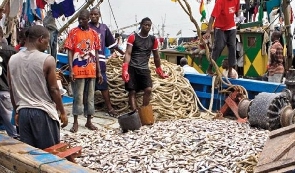The subsidy on premix fuel is a major contributory factor to the depletion of fish stocks in the country’s ocean, Prof. Wisdom Akpalu, Director of Environment for Development (EfD) – a global network for environmental research, has said.
Prof. Akpalu, who is also Dean-School of Research and Graduate Studies (SRGS) at the Ghana Institute of Management and Public Administration (GIMPA), said an alternative solution such as a short-term unconditional cash transfer policy must be implemented to support fishers, while the subsidy should be scrapped.
“Also, a medium- to long-term livelihood programme for supporting the children of fishers must be instituted to assist them to learn employable skills or pursue formal education,” he proposed.
Prof. Akpalu was speaking at an EfD workshop on ‘Emerging issues on capture fisheries management in Ghana’, and revealed that only 15 percent of fishers want their children to inherit their trade; hence the need for scrapping the subsidy and utilising the funds to deliver livelihood empowerment programmes for the majority of fishers and scholarships for their children.
Currently, he said, data available to EfD indicate that the cost of premix fuel is reduced by 70 percent to fishermen through subsidy – and this is partly fuelling the act of illegal fishing.
Though government expends US$ 40 million each year on premix subsidies – and only 20 percent of the amount, according to the EfD, goes to fishermen; as the system is allegedly characterised by illegalities.
Illegal fishing comes with many challenges. For instance, the Environmental Justice Foundation (EJF) has estimated that Ghana loses more than US$ 200 million to illegal fishing annually, with the canker still endemic.
Illegal fishing constitutes overfishing and Illegal, Unreported and Unregulated (IUU) fishing, among others.
Indeed, data from the Fisheries Commission indicate that the country currently has over 14,000 canoes on its seas with about 176 industrial trawlers, of which 19 are seaworthy.
Prof. Akpalu however argued that the country should ideally have a maximum of 9,000 canoes and a strongly regulated industrial trawler subsector.
“These situations, when left unchecked, could collapse the country’s capture fisheries sector and the entire industry,” he warned.
Ghana consumes over 950,000 metric tonnes of fish annually, and currently imports over 60 percent of its fish needs. The Ministry of Fisheries and Aquaculture Development (MoFAD) has attributed the high level of imports to the country’s depleting stocks and the need to urgently address it.
Over 600,000 metric tonnes of fish are imported into the country every year, with the country’s annual catch estimated to be less than 400,000 metric tonnes.
The fishing industry in Ghana brings over US$ 500 million into the economy every year and employs over 3 million people along its value chain, according to MoFAD.
Business News of Thursday, 2 February 2023
Source: GNA













